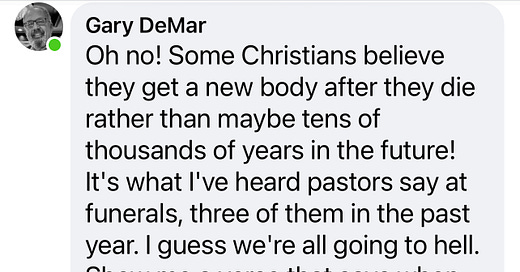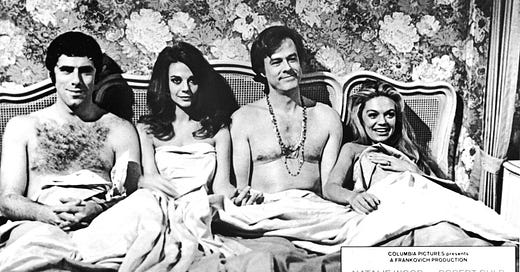
Resistance Is Not Futile
Joe Boot’s 𝑇ℎ𝑒 𝑅𝑢𝑙𝑒𝑟 𝑜𝑓 𝐾𝑖𝑛𝑔𝑠 is a rigorous, robust, and intelligent reaffirmation of the biblical worldview in the face of reigning secularism-neopaganism.
Dear friends and supporters,
This is a review of Joseph Boot’s latest barnburner book, but don’t expect an unbiased assessment. Joe is a dear friend, and no doubt my affection and respect for him prejudice my assessment. In case you don’t know, Joe is founder and director of the Ezra Institute, a ministry of cultural theology and philosophy like our own Center for Cultural Leadership, a sister organization, in fact. Joe launched Ezra while pastoring Westminster Chapel-Toronto, which he planted, and now Ezra is expanding to the US and UK. Like CCL, it’s a think tank, but Ezra also hosts numerous residential training events. You can learn more about these programs here. I’ve spoken at these programs and I’m scheduled to speak at more in the future.
Joe has always been a gifted speaker and writer, but his ministry has become even more refined and trenchant in recent years under additional intellectual influences. His magnum opus (thus far) is the much longer book The Mission of God, which is theologically indebted to historic Puritanism, presuppositional apologetics, theonomic ethics, and Christian worldview. In this latest book Joe has absorbed the more extensive and profound Reformational paradigm of thinkers like Abraham Kuyper, Herman Bavinck, and, in particular, Herman Dooyeweerd, without shedding his earlier theological and intellectual benefactors.
Ruler of Kings bulges with sharp insights, some of them ingenious, and it’s hard to summarize them, but five leading themes seem to pervade the book, which is a collection of loosely related but coherent essays and lectures, most of which have been previously published.
What are those leading themes?
God’s Sovereignty, or Man’s Rebellion
First, God in Christ is sovereign over everything, and rules by his creational and biblical law; and the agenda of sinful, rebellious man is to replace God’s rule with man’s. Autonomy is the Original Sin, but in the postmodern world, it has become a form of ideological, intellectually structured rebellion. Man not only wants to be a law to himself (that’s the meaning of autonomy), but also to create elaborate intellectual schemes justifying his autonomy. A great historical shift occurred with the “inward turn”: the external world has no normative role in shaping humanity’s life. Rather, the resources for man’s life and its rules derive entirely from within man himself.
The external norm in terms of which man is God’s creature made in his image must live is God’s revelation, notably creational law, or norms, woven into the structure of created reality, as well as the propositional revelation of the Bible, biblical law. Joe embraces Dooyeweerd’s distinctive Cosmonomic Idea: the law (nomas) of the cosmos. Creation carries with it its own norms and rules; it’s the OS (operating system) of the cosmos. The Bible points to and elaborates on some of these rules, but not all of them. This bivalent view of revelation avoids a bare biblicism on the one hand and an autonomous “natural law” on the other. Creation and the Bible structure, supplement, and support, each another.
Against this divine revelation autonomous man champions “the cult of the expert.” An anointed elite (Thomas Sowell) fashion their own norms. Abstract, statist, and wildly inaccurate Covid modeling and economic rigging by means of currency regulation are only two prominent examples.
Truly prophetic thinking, alternatively, demands relying on God’s wisdom and his revelation, creation and the Bible, happily accepting the world as God created it, and not rebelliously trying to reengineer reality, an agenda whose consequence is always catastrophic. If you try to break the OS, it eventually breaks you.
Biblical Nationhood, or Globalist Utopia
Second, the anointed experts, having abandoned hope in Christ and his kingdom, strive to create an earthly global contra-creational-and-Christian utopia, countering God’s orderly design of a collection of Christ-honoring nations. This utopian dream is both secular and pagan, and both are not ultimately at war with one another but ally in opposing the Creator. Secularism governs the “public,” political realm, and paganism the “private,” spiritual realm. The “public” realm is declared to be neutral, free of all presuppositions, when in fact it’s radically anti-God, and the “private” realm is existential, mystical-pagan religion.
The utopia must be globalist, because it must destroy all distinctions. Distinctions imply differences, and the new secular neopagan order must be an undifferentiated postmodern Tower Of Babel, a new world religion without dissent:
Therefore, by eliminating distinctions in gender, economic prosperity, ethnicity, knowledge, health, moral values and more, all mankind will be humanized, equalized and socialized, united as one universal entity and the unification of the godhead will have been achieved. At this dreamed-of historical moment, socialized humanity will finally be classless, stateless, family-less, gender-less, lawless, religion-less and an essentially structure-less collectivity of beings in harmony with themselves and the other (nature).
Advanced technology furnishes a vehicle for creating this utopia in which humanity itself can be transcended: transhumanism posits man as simply a single node, not the final stage, in evolution toward a perfected humanity in the global utopia. This technocracy pursues…
everything from cloning to the modification of human organs, the creation of a synthetic human being, control of the weather, elimination of crime by treatment, modification of food, colonization of the universe, development of an artificial sun, elimination of disease, creation of transhumans, forced sterilization, and postponement or deliverance from death.
In marked contrast, the biblical world is one of God-created, wholesome, distinctions and differences, a world not perfect before the consumation, but nonetheless gradually improved, not by man‘s efforts, but by the blood and resurrection of Jesus Christ, empowered by the Holy Spirit. This is the advance of the kingdom of God, which is the antithesis of a globalist utopia.
There is no Babelic globalism in this picture, but rather numerous nations stamped by their own historical traits and distinctives, yet all of them eventually recognizing the authority of God and his revelation. No nation dictates to another, but fulfills its own, unique calling under God’s authority. This, in Joe’s language, is biblical nationhood, but it’s by no means to be identified with today’s revived populist nationalism.
The Christian nation doesn’t imply an established church but, rather, an established faith in the heart of its citizens, including many of its political leaders. This non-ecclesiastical Christian establishment is also non-sectarian. It’s not Presbyterian or Baptist or Methodist or Roman Catholic, but rather based in basic Christian orthodoxy, the early ecumenical creeds.
God’s Law, or Liberal Democracy
Third, the political form of the global utopia is liberal democracy, which has afflicted the West for several hundred years. Joe is happy to affirm the truth that political governments should represent their people, including checks and balances, and the free society, gifts of classical liberalism. This is the functional operation of a free and democratic people.
Gradually, however, democracy has developed a substantive character. It is no longer a method of preserving a Christian commonwealth, for example, but is an end and itself: the voice of the people is the voice of God. In other words, liberal democracy has traded the diffusion of political authority, what the Bible implicitly envisions as the best possible political system in a fallen world, for the concentration of ultimate political authority among the citizenry, who almost always cede that authority to elite politicians. In this sense, liberal democracy has revealed the secular neopagan goal of replacing God’s authority with man’s.
In this way liberal democracy has become the great social heresy of the West. Heresy literally means setting one’s own private opinion against received opinion. It began originally in Christianity as an ecclesiastical truth: the orthodox versus the heretics. But it’s a mistake to limit heresy to the church. When private opinion gains the ascendant not just inside but also outside the church, democracy becomes a social heresy.
Most nations of Europe and North America were once rooted, although always imperfectly, in the external standards of God’s revelation: the Bible or creation. Authority comes from outside man, from God. Liberal democracy threw off the benevolent yoke of God’s authority and substituted man’s authority. This heresy resulted in the unimpeded growth of the state, since politics has become the voice of the people.
This is exceedingly dangerous, because it means that there is no transcendent check on political power: the king, or president, or Congress, or parliament, is no longer subject to God‘s law, but can devise any law. How this played out in communist and fascist states, getting rid of personal liberty and due process and murdering political opponents, is only an extreme version of what is happening in the more benevolent liberal democracies. When you abandon God’s authority in society, you never know at what dreadful destinations you will end.
Will you consider a tax-deductible donation to CCL via PayPal or Venmo? Or mail a check to CCL, Box 100, Coulterville, CA 95311. God uses you to keep us going — and expanding.
Church, State, or Kingdom
Fourth, because Christians historically and today haven’t understood the meaning of and relation between church, the state, and the kingdom of God, their work in God’s world has been seriously misguided and distorted. Joe contends church (ekklesia) denotes a number shades of meaning in the New Testament, for example, the invisible church, the visible church, the historical church, the local church, and institutional church. There’s long been a tendency both to inflate and deflate the importance of the church, however defined.
In Russia and Eastern Europe, the magistrate, usually the emperor, was the head of the church. This well-intentioned arrangement started with Constantine. Formally the same was true in Great Britain with Henry VIII and the rise of Anglicanism, though its practical out-working was much less pronounced. In Russia and Eastern Europe, the state dominated the church, which was its arm. The church was subservient.
By contrast, in the medieval world, the church in effect dominated all of life, including the state. This is an example of ecclesiocracy, the rule of the church. This meant that all areas of culture were eventually suffocated by the Roman Catholic hierarchy:
This view of the church itself as a universally instituted power over all life was reinforced in the High and Late Middle Ages because Roman Catholic theology, as mediated through the Aristotelianism of Thomas Aquinas, regarded the church as belonging to a domain of grace, above and superior to nature. This involved a strictly hierarchical view of reality and society with the church perched at the top as the gateway to eternal perfection and bliss — the state playing a support role in bringing people toward earthly moral perfection. The church's “super-natural” theology of grace, a donum supperadditum (an added gift), meant that for culture to be Christian it had to be an ecclesiastical culture — that is, largely led and governed by the instituted church …
Joe calls this the churchification of Christianity.
Today, we suffer from a still different problem. The church has been marginalized into nothing more than a special interest group or social club, so nonessential that its Lord’s Day meeting can be summarily prohibited during an alleged pandemic. The church has basically been disposed of.
In some ways the state has become the new church, offering its law as creed, as well as absolution, redemption, and meting out hell on earth.
Each of these errors derives from a misunderstanding and misapplication of the kingdom of God. The kingdom of God is simply the reign of God, larger and more basic than either church or state, and it’s the great message of the Bible. The Triune God is the world’s King, and as a result of the Fall, God sent his Son to die on the cross and rise from the grave to his cosmic kingship by redeeming both individuals and the creational world.
The church is pivotal in God’s plan, but it’s not identical to the kingdom. We seek first the kingdom, not the church. The fact leads to the fifth and final theme of Joe’s book, sphere sovereignty.
Sphere Sovereignty, or Consolidated Power
Sphere sovereignty is integral to the Christian worldview, and it’s impossible to grasp the biblical view of governments without it. Notice I said governments. When we hear “government,” we ordinarily think of politics, national or state or provincial government. But historically, and notably in the Bible, a number of governments exist. For example, there’s family government, church government, business government, artistic government, self-government and civil government, one among many. (This construction was popularized by R J. Rushdoony.) The reduction of the idea of government to civil government is a flagrant violation of sphere sovereignty. What, then, is sphere sovereignty?
This is the idea that God created various spheres of life like the family, church, and business to mediate his authority. Each sphere reflects its own unique, God-established structure, laws, tasks, and goals. Under God’s authority, each is sovereign. It may not dominate others spheres, nor may it be dominated by them. This means, for example, the church is not an appendage to the state, nor may the church dominate the state. The family does not lose its identity in the church, nor is the church simply a collection of families. Business doesn’t operate as an organ of the state, or vice versa.
Violations to sphere sovereignty appear everywhere historically and today, but one embraced by many Christians is that the church is the dominant sphere of society, the conduit through which God pours out his blessings. Both the family and the state are blessed as they submit to the church. This idea is no less pernicious than situating civil government as the conduit of salvation, provision, and blessing for all of society.
This latter problem also abounds. An apt metaphor appears in Star Trek, The Next Generation, and my mentioning it is also apt, since Joe Boot is such an avid Star Trek fan. The great nemesis of the starship Enterprise is the Borg, the collectivist and collectivizing alien body tearing around the galaxy assimilating all other beings to create its one united, undifferentiated collective. Its ominous message to those who oppose its assimilation project is: “Resistance is futile.” This is the implicit message of postmodern statism, which wants to assimilate every sphere of life and subjugate it to politics. The state is the collective.
Conclusion
These five are simply the leading themes of a book bristling with memorable insights. The Ruler of Kings is a rigorous, robust, and intelligent reaffirmation of the biblical worldview in the face of reigning secularism-neopaganism; and Joe’s premise is that only comprehensive worldviews can vanquish other comprehensive worldviews:
We must confront systematic unbelief with systematic belief, expounding and living out a Christian world-and-life view, grounded in the scriptures, one that unveils the beauty of the treasures of wisdom and knowledge hidden in Christ. And we must do so not simply in private, but in every area of our lives.
This unapologetically take-no-prisoners broadside presupposes a basic knowledge of Christian theology, church history, and Western philosophy. This book is neither for the fainthearted nor the weak-minded. Joe outpaces earlier Christian worldview thinkers like Francis A. Schaeffer in scope, learning, and rigor, and The Ruler of Kings is precisely the kind of energetic scholarship necessary to combat and conquer the ubiquitous secular and neopagan world views.
To Joe Boot, resistance is not futile.
Yours for the Ruler of Kings,
Founder & President, Center for Cultural Leadership
Listen here.
More great stuff:
The Center for Cultural Leadership site is here.
My Amazon author page (print and digital) is here.
You can find my sermons and lectures at my YouTube channel.
Sign up to get my blog updates here.
Here’s my Twitter feed.
If you want to get the free exclusive hard copy publication Christian Culture, please send me a Facebook private message.
The CCL phone number is 831-420-7230.
The mailing address is:
Center for Cultural Leadership
P. O. Box 100
Coulterville, CA 95311











